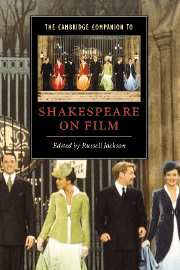Book contents
- Frontmatter
- Introduction
- PART 1 ADAPTATION AND ITS CONTEXTS
- PART 2 GENRES AND PLAYS
- PART 3 DIRECTORS
- 9 The Shakespeare films of Laurence Olivier
- 10 Orson Welles and filmed Shakespeare
- 11 Grigori Kozintsev's Hamlet and King Lear
- 12 Franco Zeffirelli and Shakespeare
- 13 Flamboyant realist: Kenneth Branagh
- PART 4 CRITICAL ISSUES
- Further reading
- Filmography
- Index
9 - The Shakespeare films of Laurence Olivier
from PART 3 - DIRECTORS
Published online by Cambridge University Press: 28 May 2006
- Frontmatter
- Introduction
- PART 1 ADAPTATION AND ITS CONTEXTS
- PART 2 GENRES AND PLAYS
- PART 3 DIRECTORS
- 9 The Shakespeare films of Laurence Olivier
- 10 Orson Welles and filmed Shakespeare
- 11 Grigori Kozintsev's Hamlet and King Lear
- 12 Franco Zeffirelli and Shakespeare
- 13 Flamboyant realist: Kenneth Branagh
- PART 4 CRITICAL ISSUES
- Further reading
- Filmography
- Index
Summary
Olivier made his three Shakespeare films as the result of multiple promptings. Despite uneasiness about his own Orlando in the As You Like It film directed by Paul Czinner in 1936, he became interested in exploring the potential of the cinema for the presentation of Shakespeare's plays and he managed never to abandon the theatricality implicit in the plays in the films he directed. He was conscious, too, of the different and wider cinema audience to which he would be bringing Shakespeare, and which in the 1940s still retained 'its slight preponderance of women, its heavy working class bias and its very strong “youth” bias'. In the case of his first film, Henry V, there was, of course, also the persuasive power of the wartime Ministry of Information, anxious to promote a film which would boost national morale. This chapter will approach the films in the first instance through the diverse opinions of critics, in particular those of their first reviewers.
All Olivier’s films are remarkable for their constant oscillation between the cinematic and the theatrical, and their fusion of the two distinctly different dramatic languages. Not only does this arise from the unconscious instincts of Olivier the film maker, an indication of his claim to be an auteur, but there is, too, a conscious shifting between the elements of the two media. Some argue that this oscillation is less a distinguishing feature than a flaw. ‘Try as he would to be cinematic in his directing and acting’, Robert Hapgood has written, ‘Olivier often fell between the two stools of theatre and film . . . One must acknowledge that as a film director his blocking now seems static and stage-bound.’
- Type
- Chapter
- Information
- The Cambridge Companion to Shakespeare on Film , pp. 163 - 182Publisher: Cambridge University PressPrint publication year: 2000
- 5
- Cited by

